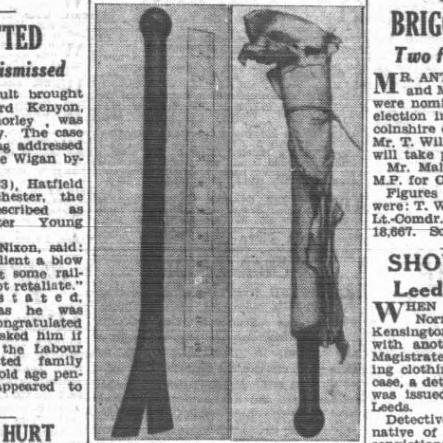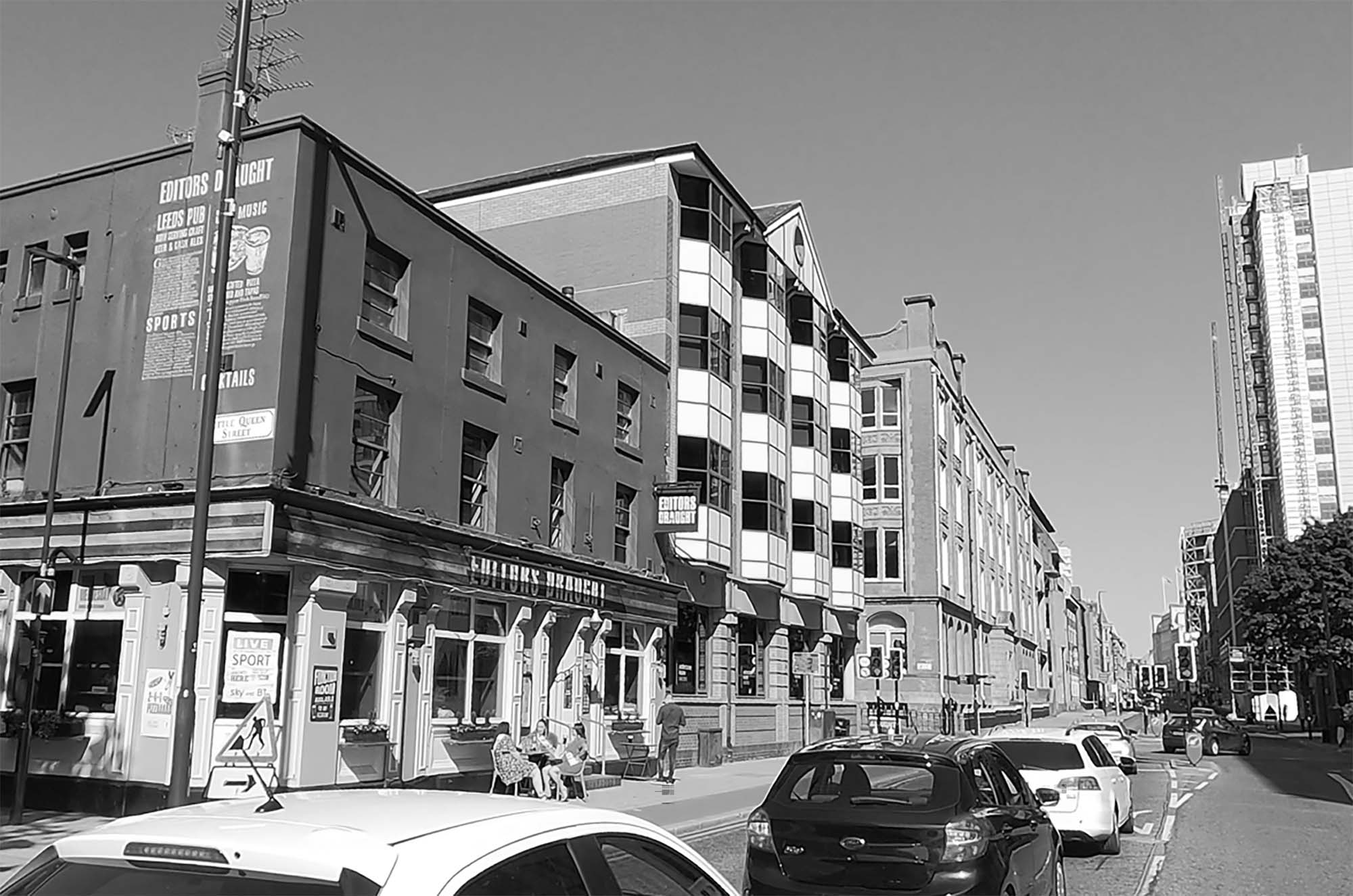

Age: 77
Sex: male
Date: 18 Mar 1948
Place: Wellington Street, Leeds, West Yorkshire
Stephen Henry Warner was beaten over the head in his basement shop in Wellington Street in Leeds on 13 March 1948.
Stephen Warner was a leather craftsman and portmanteau maker and was attacked and robbed in his shop on the Saturday 13 March 1948. He was found unconscious and taken to Leeds Infirmary where he died without regaining consciousness in the early morning of Thursday 18 March 1948.
It was thought that he had been attacked with a 14-inch steel packing case opener that had been wrapped up in brown paper which was later found by the police.
A small amount of money was reported as having been stolen.
Stephen Warner had a compound fracture of the skull and an operation was carried out on him during the weekend.
A doctor said that his cause of death was bronchial pneumonia after multiple head injuries. He said that his injuries were consistent with Stephen Warner having been struck with a heavy instrument and added that there were no other marks of violence except a slight bruise on his left ankle.
Stephen Warner was found by a commercial traveller's friend. The commercial traveller said that they had gone to Stephen Warner's shop and that his friend, 'went into the shop, then dashed out again and called me in to help'. The commercial traveller then said, 'I found the old man lying behind his bench with severe head injuries. We attempted to lift him up on to a stool and gave what assistance we could'. Both the commercial traveller and his friend had lived in Roman Avenue.

The commercial traveller said that it was hard to say whether Stephen Warner had been conscious when he found him, he said that his eyes were open, but that he didn't speak.
When the commercial traveller was asked whether Stephen Warner's place was in disorder, he replied that it was difficult to answer because he thought that it would have been in disorder before he was assaulted.
At his inquest, the coroner said, 'This was a calculated and unhuman assault on an old and industrious citizen of Leeds. It took place in broad daylight in a busy thoroughfare, at a time when many people were about. It is inconceivable that no one saw anything unusual. A moral obligation rests on the citizen to help in the detection of crime. It is the duty of everyone who can help to respond to the appeal of the police'.
The police interviewed over 1,000 people in the first week of their investigation. By the time his will was heard in August 1948, the police stated that they had interviewed more than 2,000 people.
The police said that the only motive that they could discern was robbery. They said that at about 10.30am on a Saturday morning that it would have been impossible for anyone to have entered or left his premises without having been seen, but that up to that time no one had come forward with any information.
They said that they had found traces of brown paper in which they thought that the murder weapon had been wrapped in and had interviewed paper manufacturers in the West Riding in an effort to trace its source.
On Monday 22 March 148, the police put out an appeal for a woman in black that was thought to have seen two men near Stephen Warner's shop near the time of his murder. They said that the woman, who had been wearing a black hat and coat and who had been sitting on the lower deck of a Corporation tramcar that had passed Stephen Warner's shop at about 10.36am on the Saturday morning, might have been able to describe two men that she was thought to have seen outside the shop. She was said to have travelled on a Briggate to Kirkstall Abbey tramcar on the morning of the murder.
Stephen Warner's son-in-law said that he last saw Stephen Warner about a year earlier but said that he understood from his wife that Stephen Warner had been in good health at the time.
The police opened his shop on Saturday 20 March 1948 for people to come and collect their repairs.
Stephen Warner's family later reopened his shop on Thursday 25 March 1948 daily from 9am to 6pm in the hope that some of the 400 cases there left for repair would be claimed. However, they said that they intended to sell the shop.
On Tuesday 30 March 1948, it was reported that the Leeds City Police received an urgent summons to Stephen Warner's shop in Wellington Street after a policeman on patrol saw light burning in the shop, which was securely fastened. It was said that a police car was sent to Roundhay View in Leeds where Stephen Warner's son-in-law lived, and he was brought to the shop to make a thorough inspection. However, he said that he found nothing disturbed and said that he must have left the light burning the day before.
When the chief constable later spoke at the Leeds Publicity Club on Thursday 18 March 1948, he referred to 'a most gruesome, foul murder', which was said to have been a reference to the murder of Stephen Warner at his shop. He spoke of having received little information from the public, saying, 'Yet at the moment we have no help at all. We intensify our appeal to the public to help us all they can in this matter. Many of my colleagues do not agree with me about this, but I think the time has gone when we should creep about like Sherlock Holmes, looking for clues which have not been left, we are not so fortunate as Dick Barton. We do our best but when you know we only succeed in detecting about one-third of the crime committed in Leeds, I feel that this is not good enough, and if the old, orthodox methods have not succeeded we have to try something new'. He went on to state that there was nothing new in the suggestion that every member of the community was equally responsible for the good state of the community adding that that was the basis of English Law. He went on to say that in order to get the public to face its responsibilities in that respect, that they, the police, must encourage publicity of the right kind. He said, 'Our policy today is that we tell the Press as much as we possibly can, and our relationship with the Press is extremely good. It is much better than when I joined the service, when at one force there was a rule that the Press should be told nothing. They told us nothing either and I am quite sure that in the end it was far worse for us than for them'.

The police later said that they thought that the murderer was not a local man else they felt they would have caught him by that time, and said that they were considering the following:
The police said that if the murderer had left Leeds immediately after he attacked Stephen Warner, then he would have been out of the city when the hue and cry was raised.
A reward of £100 was offered for information leading to the arrest and conviction of his killer.
Stephen Warner had lived in Haddon Place with his invalid wife. He was cremated at Lawnswood Crematorium on the afternoon of Tuesday 23 March 1948. There was no service and only a few relatives and friends filed into the church. His wife was unable to attend. Although there was no service, the organ played for a few minutes before the cremation.
On Friday 27 August 1948 Stephen Warner's will was settled. He had left £12,076 (net personalty £12,048). £200 had been left to his brother and the remainder to his 76-year-old invalid wife for life. After his wife's death the money was then to be divided between his two daughters
It was noted that offices above Stephen Warner's shop belonged to the British Railways and were used for the office of the District Passenger Manager of British Railways and that by October 1948 they had been burgled five times. On 5 October 1948 it was reported that the offices had been broken into for the fifth time in recent months. It was reported that desks had been opened and contents strewn about but that little was missing.
see www.westyorkshire.police.uk
see Yorkshire Evening Post - Friday 19 March 1948
see Yorkshire Evening Post - Thursday 18 March 1948
see Gloucester Citizen - Thursday 18 March 1948
see Yorkshire Evening Post - Tuesday 23 March 1948
see Yorkshire Evening Post - Friday 23 April 1948
see Lincolnshire Echo - Monday 15 March 1948
see Yorkshire Evening Post - Friday 27 August 1948
see Yorkshire Evening Post - Tuesday 30 March 1948
see Yorkshire Evening Post - Thursday 25 March 1948
see Hull Daily Mail - Monday 15 March 1948
see Yorkshire Evening Post - Tuesday 11 May 1948
see Daily Mirror - Monday 22 March 1948
see Yorkshire Evening Post - Tuesday 05 October 1948
see Unsolved 1948